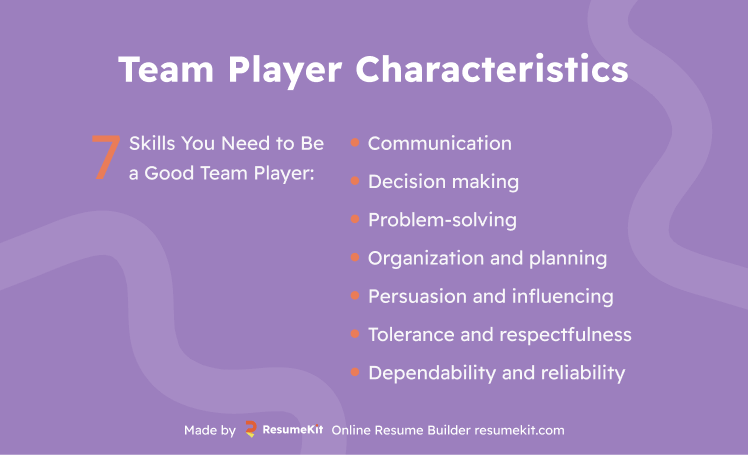Team player skills are essential in a successful organization. Knowing how to work well with your colleagues will increase your value in the workplace.
Are you a me-first or company-first employee? Either way, you need to collaborate with others to achieve your goals and the organization’s. Whether you’re part of a team or preparing to join one, being a team player will make your life easier.
This article discusses traits of a team player, and why being a good teammate is important. We will also highlight core team-player skills and how to let employers know you have what it takes.

Table of Contents
What Is a Team Player?
Merriam-Webster defines a team player as someone who cares about helping the group or organization to succeed. A team player is integral to the completion of group objectives. They knit everything together and make sure everyone is working towards a common purpose.
Every group needs at least one team player, who may or may not be the team lead. Team players keep their eyes on the overall goals or project. They carry others along, keep an open mind, and have attentive ears. Team players foster a sense of belonging and make everyone working on the project feel valued and productive.

Nine Characteristics of a Team Player
If everyone is moving forward together, then success takes care of itself.
These words by Henry Ford, the great American industrialist, capture the core importance of great team players: they enable success. An organization full of team-centric individuals is very likely to hit all its targets. So if you play your part well, you get to share in the success and enhance your own professional reputation.
Here are more characteristics of a team player – why being a great team player is important, for an organization and for yourself:
1. Increased creativity
When everyone in a group is on the same page, ideas flow more freely. One person’s rough stone will become the whole team’s fine sculpture. Everyone shares their opinion to make the product better while speeding up the task cycle.
2. More efficient work
Two heads are better than one, goes the old adage. This holds true in the business arena. When a team divides work and allocates according to individual strengths, everything goes faster and proceeds more smoothly.
3. Happy atmosphere
Great team players go out of their way to make group settings a convivial affair. A friendly atmosphere will make everyone feel at home and more inclined to contribute productively.
Recent research indicates that happy employees generally work harder compared to dejected ones. Team players who can foster camaraderie that leads to optimum performance are an important component in the workplace.
4. More rounded employees
Everyone in a team has their strengths and also room for growth. Enthusiastic collaboration also creates situations where team members can learn from one another. Areas of weakness can be improved and areas of expertise shared with others. This mutual learning leads to mutual appreciation, which in turns brings the team even closer. The organization will reap the benefits of a team that works as a unit and covers for one another.
5. Higher chance of profits for the company
At the end of the day, a company’s main aim is to make profits. Team players are more instrumental to revenue generation than employees who like to go solo.
Team-centric workers understand they’re important cogs in the wheel. They perform assigned tasks efficiently so larger targets can be met faster. In times of emergency, they can come up with ideas and solutions, making sure the organization stays on track.
6. Stronger work relationships
When employees are disconnected from one another, the organization won’t be getting what it’s paying for. Projects move slower or get stalled, collaboration becomes stop-start, and the office space might even turn toxic.
Team players are great communicators and play a role in fostering healthy teamwork which leads to a positive work environment. A team with a high level of communication has mutual understanding and trust in one another, which is always beneficial to the organization.
7. Better performance tracking
Great teamwork fosters mutual dependence and support among team members. Someone can pick up the slack when another person is away or unable to do their work. Loopholes can be spotted and fixed with input from a fresh pair of eyes. This contrasts with a solo project where errors that go unspotted can cause delays.
8. Brings a feeling of achievement
Team players work for collective success and do their best to make every collaboration a success. They encourage their teammates, offer tips and take everyone’s contributions on board. And when the task finally gets done, there will be hugs and high fives. Everyone feels accomplished at having done it together.
9. Increases responsible behavior
As a team player, everything you do is going to affect your team members. If your part of a project turns out shoddy, the whole team will be reprimanded by management.
In a team, you’d be more determined not to let your teammates down. You will become more focused on the job and think twice before taking critical actions. This can help to avoid potentially consequential missteps.
Want to Be a Great Team Player? Get These Skills

You’ve said all the right things in your cover letter or during the interview. Great work ethic? Tick. Collaboration skills? Tick. Verbal communication skills? Discipline? Efficient worker? Tick. Tick. Tick.
However, actions always speak louder than words. You must back up your big talk with concrete evidence in the office or you’ll soon need to start writing another cover letter.
Teamwork skills are soft skills that specifically let you work effectively in an organized group. Having the will to be a good teammate isn’t enough; you must know how to do the things required of good teammates. This is where teamwork skills come into the equation.
Here are 7 team-related skills you need to have to function effectively in a group setting. We’re sure you already possess some of these. You can use the list to fill any skill gaps you didn’t notice. Thank us later.
Communication
Teamwork is all about communication. A great teammate communicates effectively with their words, their actions, and their work.
Match your approach with the type of communication. For effective in-office interaction, you must master the dos and don’ts of verbal communication.
Always strive to get your point across in a simple and concise manner, irrespective of the medium. This will convey both openness and respect for your teammates and their time.
Make yourself approachable and look like you care. Colleagues should feel welcome to talk to you or contact you.
Decision making
Disagreements are part and parcel of a collaborative effort. Rarely will everyone nod their heads to affirm a course of action. Being able to take charge when there are differences of opinion is a pretty crucial skill.
Give everyone a chance to say their mind but be ready to take a firm stand when you’re convinced about a decision. You must also have the ability to sacrifice your ego and see the big picture even when you disagree.
Problem-solving
The point of a team is to solve a problem together. Not just together, but also faster and in a better way than if the task is given to just one person.
With problem-solving skills, you’re able to examine issues from multiple angles. Being able to break down complex stuff into digestible bits for your coworkers would be the icing on the cake.
Organization and planning
When the whole team knows where they’re going and how they’re getting there, the work doesn’t look so difficult. Planning and organizing tasks and allocating them on the basis of individual strengths will increase team productivity. Everyone will know their roles and deadlines and will be able to synergize effectively.
Persuasion and influencing
Unless your team members comprise schoolchildren, you won’t be able to just order them around. Sure, you could try to boss them if you’re the team lead but you’d be risking half-hearted compliance and latent resentment.
A better way is to tactfully deploy the arts of persuasion. Don’t belittle them for honest mistakes but show them how to be better. If you compliment them when they do something tight and gently correct their miscues, they’ll be more likely to listen to you next time.
Above all, influence them through your own actions. You can speak all the nice words in the world but nothing is as effective as leading by example. When your colleagues come into the office and see your high work ethic, they’ll have no more excuses for slacking off.
Tolerance and respectfulness
Tolerance and respectfulness are twin virtues of a great team player. They’re also skills that often go overlooked. Many otherwise brilliant individuals don’t reach their potential because they lack either or both qualities.
If you’re a business genius or tech savant, you’d still likely need to work with others. Be tolerant of their opinions even if you don’t think they’re right. Keep an open mind and be mindful of religious, class, racial, and other group differences.
Dependability and reliability
A team coming together to create magic is beautiful to see. But this is only possible when every member completes their part of the job.
Unlike in a solo setting, your accomplishments in a team depend on other people and theirs depend on yours as well. Set the tone by being dependable and reliable. Turn in excellent work, consistently beat deadlines, and find a way around unexpected snags.
Related reading: Hard Skills vs Soft Skills: What’s the Difference?
Are You a Great Team Player? Let Employers Know About It
There’s a growing body of evidence that employers prefer to hire team players. Having a fine work ethic or being great at verbal communication can help with your job prospects. But demonstrating your team skills might just be what gets you past the interview.
Treat your resume, cover letter, and interview as excellent avenues to show off your team-centric skills and achievements. Don’t be humble or understate your qualities in this respect. Go all out and show the HR personnel that you’re the one they’re looking for.
Team Skills on a Resume or Cover Letter
You’ve been chasing your dream job for a long time. The opportunity is now in front of you. You just need the recruiter to read your resume and place it in the “arrange an interview” pile.
You can help them do this by highlighting relevant team skills in your resume.
Take a look at the job description. Note down important requirements and tailor your resume to fit.
You can create a section in your resume that lists your skills. Populate it with descriptions that represent relevant aspects of teamwork.
Here’s a pool of terms:
Collaboration, commitment, critical thinking, creative thinking, community building, conflict resolution, accountability, decision making, team management, relationship building, problem-solving, leadership, decision making…
The list is not exhaustive. Remember your listed skills must match the needs stipulated in the job offer. You can also use these keywords to spice up your cover letter when applying for a position.
In both your resume and cover letter, you need to tell the recruiter about experiences that prove you’ve got collaboration skills. Make sure to fill your experience section with relevant anecdotes. You could mention the time you led a project to create a successful product or how you collaborated with another department on a major internal shakeup.
Highlighting Team Skills During an Interview
Many things can happen during a job interview. Ultimately, the recruiter wishes to know if you’re the right person for the role.
To this end, they can ask you questions that give you a chance to demonstrate comparable experience in a previous role. Any teamwork-related questions are designed to suss out if you’re a good team player.
If you’ve included any collaborative experience in your resume, you can refer to it and elaborate on the situation.
Here are a few things to keep in mind:
- Make your responses short and sweet. Don’t ramble unnecessarily.
- Quantity for experiences where possible. How many team members were involved? How much did you contribute to the overall outcome?
- Make connections between your experiences and their needs as specified in the job description.
You could prepare a list of scenarios beforehand that show your solving problems that required collaboration with others. If you’re nervous, practice with the mirror before you step out of the door.
Parting Shots
Team players are necessary in an organization that wishes to meet its goals. A company full of team players is a happy, open and productive place. Mastering collaboration skills – and using them – will elevate you to the level of a great team player.
If you’re looking for work you need to adapt to the times. Employers these days prefer applicants with demonstrable team-centric skills. Organize your resume and cover letter in a way that highlights relevant group skills. This will increase your chances of landing the job.